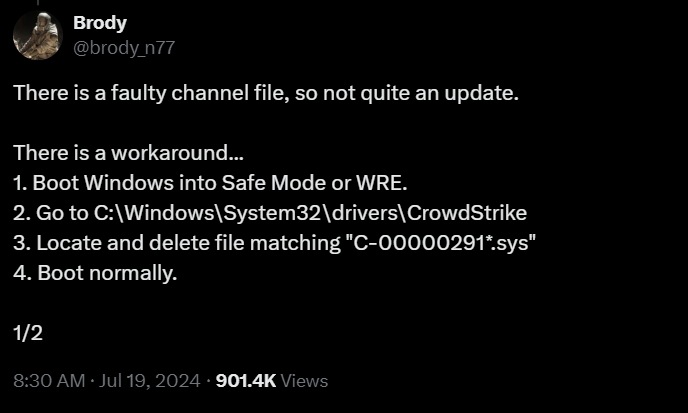According to Australian web security specialist Troy Hunt, the global IT infrastructure outage today is looking to be the “largest IT outage in history.” Reminiscing on the Y2K craze that never materialized, Troy noted that it is “basically what we were all worried about with Y2K, except it’s actually happened this time.”
Self-admittedly, a CrowdStrike (NASDAQ:CRWD) cloud update resulted in grounded planes and caused disruptions in emergency services, banking, retail, healthcare, and telecoms. Furthermore, many regular Windows PC users experienced the so-called “Blue Screen of Death.”
Those Windows PC users who have admin privileges could have remedied the problem with this solution, per the director of OverWatch at CrowdStrike, responding to cybersecurity researcher John Hammond.

CrowdStrike fully detailed the content update that has gone wrong here. After this colossal blunder, CrowdStrike’s reputation has been severely eroded from the lofty days of a projected $100 billion valuation. From Monday’s price of $377, CRWD stock plunged 18% to $309 at press time, having lost $16.16 billion of market cap.
Moreover, it is now an open question whether it is a good idea to rely on centralized cloud-based solutions for IT security. After all, it appears that a faulty update disrupted the global economy more than a concerted, malicious cyber attack.
Yet, given the cost-benefits, a shift to localized services from cloud-based solutions is unlikely. It is more likely that other cybersecurity companies will step in and nibble on CrowdStrike’s dominant 23.88% market share. Here are three stocks that could benefit.
Broadcom
Alongside Nvidia (NASDAQ:NVDA), Broadcom Inc (NASDAQ:AVGO) is one of the primary beneficiaries of the AI narrative. In fact, on a one-year timeline, AVGO stock outperformed even Taiwan Semiconductor Manufacturing (NYSE:TSM) at 80% vs 62% respectively. The latter stock belongs to the Taiwan Semiconductor Manufacturing Company (TSMC) foundry that supplies Nvidia and other companies with AI chips but has been somewhat undervalued due to lingering US-China tensions over Taiwan.
Broadcom supplies data center needs from enterprise storage to wired and wireless network components. However, the company diversified its core business with the acquisition of Symantec in 2019 for $10.7 billion, rebranding it as NortonLifeLock (NASDAQ:GEN), and selling its Cyber Security Services to Accenture (NYSE:ACN) the next year.
Broadcom’s shift into IT infrastructure was cemented with the acquisition of VMware (NYSE:VMW) worth $69 billion at the end of 2023. According to Q2 2024 earnings, 42% of Broadcom’s revenue now comes from infrastructure software while semiconductor solutions generated $7.2 billion, or 58% of the revenue.
Indicatively, while Broadcom’s data center business tracked only 6% growth in Q2, its widening infrastructure software business gained 175% growth year-over-year. Similar to CrowdStrike’s Falcon, VMware’s Carbon Black provides endpoint cloud-native protection, alongside behavioral analytics and real-time threat detection.
However, CrowdStrike is often regarded as simpler to use and easier to deploy. After the recent debacle, that may become a less mitigating factor as Broadcom’s cybersecurity division ups the game.
Fortinet
Headquartered in Sunnyvale, California, Fortinet Inc (NASDAQ:FTNT) holds an estimated 4.9% share in the networking hardware market while sharing a dominant position in the firewall market at 21% with Palo Alto Networks (NASDAQ:PANW). Following the dot-com bubble burst when Cisco (NASDAQ:CSCO) was the world’s most valued company, it now holds only 12.7% share in this arena.
Fortinet may become more prominent now, as the company has deployed a hybrid approach to IT security, using both cloud-based and on-premise solutions. Fortinet’s FortiGuard and FortiEDR are pieces of a comprehensive cybersecurity framework that requires more user engagement.
This makes it more costly and complicated than CrowdStrike, but many managers now consider it worth it. After Fortinet lowered its full-year revenue guidance last August, FTNT stock dropped 25%. Year-to-date, FTNT shares have flatlined with 0.6% returns.
Prior to the CrowdStrike debacle, 38 analysts aggregated by Nasdaq positioned FTNT’s average price target at $69.13 vs current $58.15 per share. Over the last 52-week period, FTNT average price is $61.55 with the high point of $78.82 per share.
Palo Alto Networks
Another cybersecurity firm from California, the aforementioned Palo Alto Networks Inc (NASDAQ:PANW) holds a narrowly dominant market share in the firewall market. The company’s equivalent to CrowdStrike’s Falcon is Cortex XDR as the cloud end-point protection, but is not necessarily needed to achieve Zero Trust Architecture (ZTA).
Rather, Palo Alto’s AI-powered Prisma Access (with Prisma SASE) could achieve the same, with purportedly simplified user experience for third party apps and maintenance while still intercepting malicious traffic including through SSL/TLS ports.
In May’s fiscal Q3 2024 earnings, Palo Alto Networks reported 15% revenue growth to $2 billion YoY, generating $278.8 million net income compared to $107.8 million in the year-ago quarter.
Presently priced at $328.70, PANW stock is above its 52-week average of $284.22, but still under the 52-week ceiling of $380.84 per share. Analyst consensus, based on 43 inputs collated by Nasdaq, puts the average PANW price target at $343.44 with the high estimate of $385 per share.
***
Neither the author, Tim Fries, nor this website, The Tokenist, provide financial advice. Please consult our website policy prior to making financial decisions.
